| |
"The idea of a difference between the male and female gaze is one recently stirring much conversation in culture and film alike. This has been very obvious to me since I was a kid – that the movies and films that we're seeing were very obviously from a male perspective, and it was frustrating and annoying." |
| |
Director Isabella Eklöf* |
Oh, boy. Here. We. Go.
We are not in the metaphorical territory of A Serbian Film here but the gun-metal colour of the sharp-toothed critic trap inspired by that difficult film glistens starkly in the Turkish sun. Can you appreciate a film made about something you find utterly repellent? Well, let's have a go. I first wrote 'capsule Blu-ray review' in the title above because as I finished watching the film two days ago, I vowed that I would write a review made up of very few paragraphs as the experience was not one I was especially keen on and I'd just meekly cover the extras. But then (bloody art) I could not stop thinking about the film despite my overwhelming distaste and if you can't move towards something horrific in art then you are not, nor can you ever be, a champion of the artist. If you are a frequent Outsider visitor, you may have gleaned that there is an overall positive vibe for ninety six per cent of the films we cover. In two per cent of cases we may warn people off but those works falling in the other two per cent we feel it's important to support sometimes despite our own personal feelings. As incongruent as it seems but Eklöf's role in her own work is a bit like what Roger Moore said about taking on the character of James Bond… He has to do a horrific job but takes pride in doing it well. If Holiday's director intended to alienate an audience in the most clinical way possible, then she's done an absolutely cracking job.

A young blonde woman, Sascha, strides through an empty arrivals hall at an airport. She wears stilettos and is dressed for sunlight and the male gaze. She has either maxed out her credit cards or cards given to her have been cancelled. She is met by a man whom we know from casting central is not here to make this girl's life happier or even tolerable. He states what many regard as a truth in the high-flying beauty business. Females have such a hold on male attention and desire that some unscrupulous individuals play their marks for lust-struck fools. The beautiful get their bills paid, their drinks free and the consequences of their actions rarely impact them meaningfully as long as they have the protection of the shield of powerful men. The problem is that Sascha is involved in the lucrative drug business and some vacuous, hedonistic people are attracted to the lifestyles of the rich like Trump is to the drying up water hole of even faint praise. But there's a high price to pay to be the compliant female in a depraved man's world. The question is "How tolerant of the heavy tax of sexual and physical abuse do I need to be to accept and revel in the trappings and lifestyles of great wealth?" 'Trappings' is a morbidly appropriate word. If you are even asking that question, you may want to reassess your values – or not, if living as a wealthy man's toy is worth it for the travel and the freebies. In this review, there is only one mention of the word 'love' and that was it. Sascha, revealing her lack of funds, is slapped around by the drug kingpin, the boss of the man she is inconclusively and unconvincingly attached to. Apparently this is how people learn in the drug trade. It's an intimate but vicious assault by a man who is not moved by another's distress. Indeed, that distress is the point. It's hard to see how the slaps were faked. I didn't know it at the time but this nasty little scene was, how do you say… 'peanuts' to what was on its way.
Sascha hooks up with her beau, Michael, another actor perfectly cast as a handsome but older man with obvious means. He seems to spoil her and dote on her but you just know from the bloody sand on the movie poster that these emotions are sinisterly synonymous with the simple requirements of abject servitude, compliant ownership and an utter mental and physical capitulation. As Father Dougal might say "You're not far wrong there, Ted." Despite the loathsome Michael and his singularly unpleasant hangers on seeming to enjoy themselves on the Turkish Riviera, there is an overcurrent (it's far too unsubtle to be an undercurrent) of simmering violence and sexual assault bubbling in the foreground. The power these men wield is only valid as long as they can stay clear of any jail time and they use it with the morals of the damned. It amused me that their freedom is on such a knife-edge that the whole group explodes into a frenzy of powerless vulnerability when they think one of their less IQ-gifted number may have led the police to their door. It reminded me of a balloon showing off its great size and someone admiring it suddenly shouts "NEEDLE!"
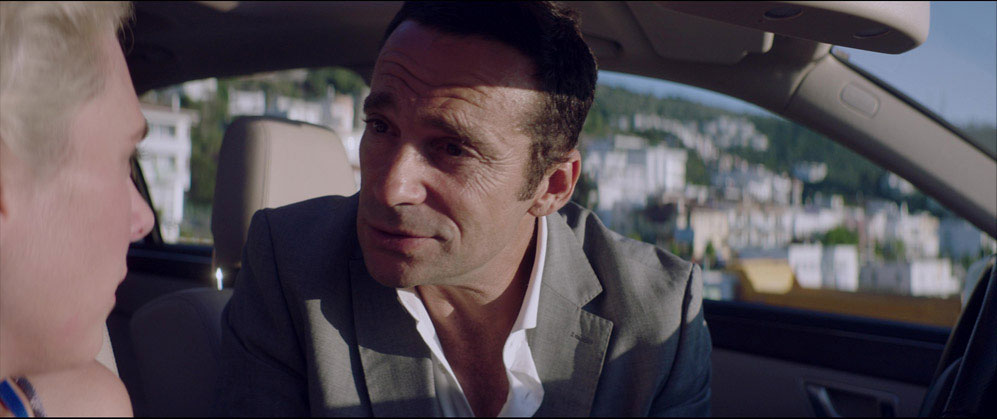
It must so frustrate immoral people of great wealth and power who must feel unfulfilled at being only able, like mere mortals, to taste with one tongue, one taste at a time, live one moment at a time and sexually assault with just the one penis at a time. With all that wealth and power, to paraphrase Plutarch on Alexander (or Die Hard's Hans Gruber, take your choice), there were no more pleasures to be had beyond the limits of an individual human body. Sascha (innocently, ha!) hooks up with an attractive Dutchman who owns a boat – not the greatest idea in the world from a drug mobster's moll. This inevitably stokes up jealousy in the fragile ego of a man whose idea of foreplay is Rohypnol. Michael makes it his business to scare the Dutchman off and events take a turn for the worse… You knew that from the start, right? You're going to have to watch several Mary Poppins movies to wash this one out of your system. A spoonful of sugar…
Reservoir Dogs had its ear amputation (actually unseen). Last Tango In Paris had its suggestion of anal sex (not explicit). Alien had its nasty, nauseating natal event (pretty explicit and brilliantly edited resulting in what an FX expert friend described as a "skateboarding penis!"). If Holiday can join the ranks of those films whose certain singular scenes define them, then it's its horrific rape scene but this penis has no skateboard. This isn't just a rape scene. It's a humiliation scene, a disgusting power play and it's performed to a locked off camera so no perverted people could possibly get off on it because editing – as we know – is too provocative. I'm assured that perverts take a lot of dissuading. When I first saw this scene (Clockwork Orange me to watch it again), I was utterly incensed. Not only was it distressingly ugly, its stark reality made me rethink the whole idea of suspension of disbelief. We have a deal with filmmakers. We know it's not real but what if it was? Would the reality of a single scene make the film more effective or immersive? Photographer Billy Kwan in The Year of Living Dangerously once said "If it's in focus, it's pornography. If it's out of focus, it's art." While this amusing definition still makes me smile, it did remind me that there is a border between the two and Holiday seemed to have crossed it, with unrepentant boots on not caring about the scuff marks.
There was a big clue to the fact that I was not seeing what I thought I was seeing and then subsequent events made me rethink what I thought was sleight of hand filmmaking. In short, and I'm pretty sure this doesn't count as a spoiler, not only does Michael penetrate his unwilling partner (not seen explicitly) but then forces her to fellate him as he ejaculates and wipes the semen on her face. You do not see penetration partly due to the wide shot covering the violent event (so to be honest, I thought I was being spared the grisly detail). And then the more grisly detail ensues. I will say hand on heart that this horrific scene was so realistic that I believed the actor and actress had performed these acts for real and was astonished that I'd seen such a thing in a film, acclaimed as it was. I have no moral high horse to mount as such but I have no wish to see a person executed on camera for real to feel immersed in a film's narrative. Believing what I was seeing as real triggered my emotional response and the filmmakers were now inadvertently caught in a Schrödinger's Cat web… If I interpreted what I was seeing as real, did that make the experience of watching the film more valid? Or what if it was faked? Then the actress was spared and the actor was just manipulating a prop cock. So how was I supposed to feel about that? God, this is fascinating stuff. Beyond the 'was it real or fake?' lies the feeling of both being dangerously entertained or seeing someone being horribly exploited. There's a word that Eklöf uses in her interview in the extras that shifted my perspective on the rape scene by quite a jarring amount and that word can be found here.** When you read it, you'll know exactly what I mean when you watch the sequence…
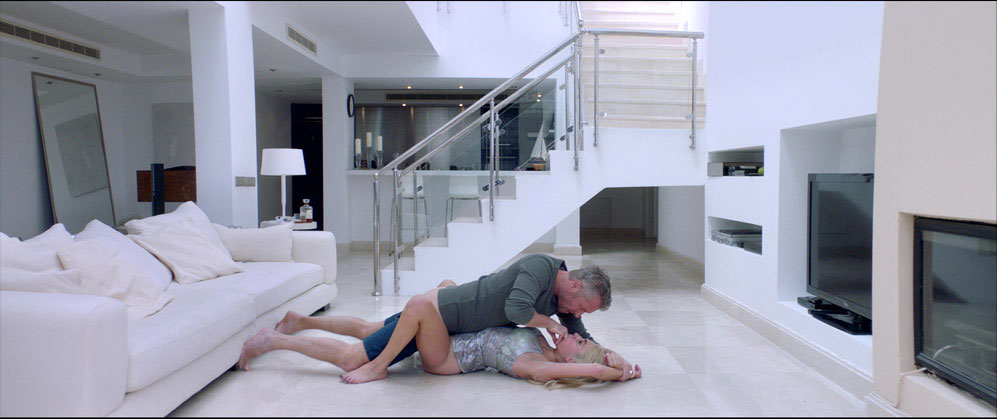
And a good thing to remember is that the scene plays so horribly well (as in it successfully made me sick) because we know that Sascha's ungiven 'consent' is her physical inability to get away from Michael. She tries to flee from him twice. His removal of his expensive watch practically gives away that he's about to do something unspeakable to this poor girl. Her character chooses mute passivity over violent struggle because she knows the latter will get her hurt as well as raped. A friend of mine who'd been raped said that passivity is a very difficult state to enter into given that the first instinct is to struggle to get away. But it was the only way to emerge physically unhurt. The lead actress Victoria Carmen Sonne is convincing as the Barbie doll in a meat grinder. In saying that, I mean that as a pretty face and desirable shape, this is all the status she has in such a dangerous environment. Despite the lingering, multi-minute close up shot of her performing in front of a nightclub mirror, I had some trouble seeing beyond her eyes. She's either playing a difficult and vacuous character to perfection or there's some reality in her lack of awareness that I was simply not getting to grips with. It all strikes me as completely deliberate. Sascha is not as unlikeable as those who do her harm but she's far from sympathetic and herein lies the interest in the film and the hook that had me abandon the two paragraph pass on it. Again, brilliant in his horrific nature is Michael played by Lai Yde. I just wanted him and his terrible friends to stop defacing my TV screen. Incidentally, in the Q&A extra, director Eklöf reveals that lead actress and actor hated each other. Wow. Quelle surprise… Life imitating art?
After the rape scene I was cued in that justice was not even around the furthest corner. There's one hint at police intervention but Sascha chooses to keep dark deeds all in the family. This is a world where there is no such thing as fairness and Eklöf's new order has not only flown from the outlying building of mainstream convention but methodically shat on all of its windows. Is the film's apparent bravery separable from its craft or are the two the brown of the combining of the coffee and the milk?
Holiday, while far from financially successful, has been a critical darling. Sight and Sound placed it as the 43rd best film of 2019 and The Guardian's Wendy Ide gave it a five star review. The web suggests that it has made under three grand in distribution. I wish it well on Blu-ray but it's a tough sell. I applaud the furthering of what is extraordinarily difficult cinema (less for the horror of the rape and more for the awfulness of the characters and 'having' to spend time with them) but even applying normal critical standards to a film like this is like having a go at someone's nail polish as you're being kneed in the genital region. I may lose all credibility with nit-picks but I have to say that I was irritated at the first shot by the camera pan that moved too slowly. It also lost Sascha's shoes from the lower frame line on the move. I think the metaphor of the innocent striding into a brightly lit but human-less world was interesting but technically I wished for a little more. To illustrate another important point, what if you were making a film and in the film there had to be a band playing but they had to be of recognisably low quality. So as a filmmaker, you can never state this categorically. You have to rely on the audience to glean your intentions. My criticism of the blandness of the script may be perfunctory because it was most probably intentional. Exchanges between different language speakers may be at the heart of my unease with the simplicity of the dialogue but it was all so on the nail. The visuals took the sub-textural weight. Directorially, Eklöf favours Kubrickian rock solid static shots so the film, Brechtian in its nature, never invites us too close to either character or event. In this way, the rape scene is just witnessed not revelled in (though I found it all too easy to be utterly repulsed by it). So while the edit took as much skill as a slightly 'more edited' film would, the film's pace is somewhat leisurely especially because narratively we simply don't travel very far. And in a later scene, is there a body in those black bags or just general rubbish because they look awfully light… As I said, nit-picks.
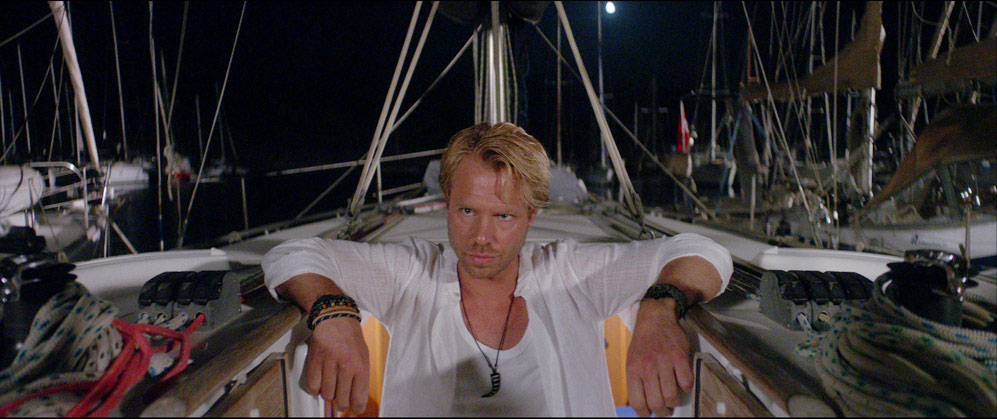
Holiday is repulsively fascinating and proves that cinema is a wide net catching the bigger fish and the sometimes infinitely more interesting minnows. I'm sure multiple viewings will prove Eklöf's craft to be much more wide ranging than I can give credit for here. But once seen, never forgotten. I'll leave further analysis to those who can stomach the company of these despicable people more than I.
The 2.35:1 presentation was shot digitally and it looks as bright as sunlight and as sharp as can be. The lifestyles it's depicting may be dark and oppressive but the Turkish Riviera is having none of that Godfather nonsense. Cinematographer Gordon Willis would have a cardiac arrest working on this film. Contrast levels are spot on with lots of clear detail and the colours pop out of the screen. There's no grain. How could there be?
The original 5.1 surround sound is extremely well mixed, both in subtle and gross moments and only on some pounding car bass does the sub get any real action.
There are optional English translation subtitles and optional English subtitles for the deaf and hard-of-hearing.
On Holiday (2020): An in-depth interview with writer-director Isabella Eklöf on the creation and production of her debut feature (19' 43")
Eklöf gets my vote right from the start appreciating the power of the cut after some goofing around with a camera and a friend. At film school she felt constrained as she was pushing too many boundaries and her approach to sexuality gave a few people pause. No surprises there. In fact did she refer to herself or her ideas as 'yucky'? I may have misheard that. She talks about how dull it is to be trapped in an evil situation by evil men. She also says that she winces when she sees the scenes shot on the first day. "The first day's shoot is always shit!" she says. Finally (and as an editor I can both relate to and fight against her contention) she took over a re-edit once her editor had locked the film and moved on because when sound enters the equation, sometimes cuts have to be redone. I am partially on board with this idea but part of me is thinking "Why not have the sound ideas developing during the edit?" But no matter. It's a solid interview with a filmmaker who's going places but if it's on Holiday, I won't be joining her. Facetime or Skype only.
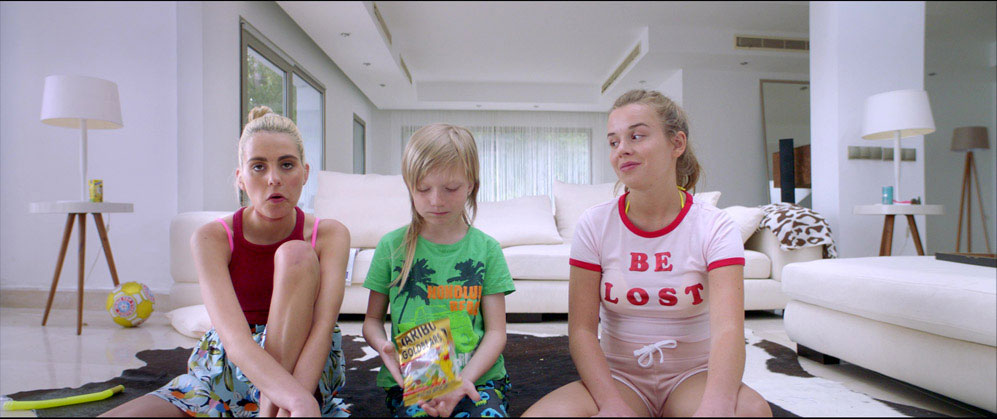
Q&A with Isabella Eklöf (2019): the filmmaker in discussion with critic Lizzie Francke, recorded at London's ICA (28' 47")
A fascinating Q&A that sheds a lot more light on 'that' scene and the overall thinking behind all aspects of the film. Eklöf is forthright, uncompromising and clearly at home with a live audience. I was very glad to hear that at least one member of the audience was taken in by the reality of the rape scene. The questions are good ones but the audience seems to be completely in one mind. I didn't hear any responses that mirrored my own (oh, poor me) but I would loved to have been there…
Deleted scene (3' 01")
This has to be an alternate first meeting between Sascha and her awful, drug running, money laundering mobster family. She is bothered by some young locals after watching Liverpool score a goal (is Liverpool F.C. big in Turkey?) but the planted seed of the strawberry smoothie she pokes at with her straw is the most interesting part of again, an underwhelmingly written scene. The smoothie comes in to play a little later.
Willy Kyrklund. (2002): short documentary portrait of the acclaimed author and poet, directed by Eklöf (10' 47")
This is a very poignant and loosely shot portrait of an author in physical decline. Reading from his own work, smoking and drinking, Kyrklund comes across as an intellectual cynic whose opinion of humankind is lower than a Hollywood executive's. Eklöf's DV camera takes some unusual positions in showing Kyrklund at home as he responds to the filmmakers in one instance (and I have no idea what the original Finnish word might have been) calling Eklöf "crumpet". This is a fascinating extra, obvious as the work of a nascent filmmaker but the subject is always intriguing.
Theatrical trailer(1' 49")
A captivating trailer bolstered by all the critical-darling quotes intercut with what feels like still moments from shots with very assured framing. Not afraid to throw in a few subtitles, the trailer is scored to the same version of a famous song that starts and ends the film itself. It's an African-American spiritual song first recorded in 1956 but is perhaps most famously known via the 60s Nina Simone recording. It took me ages to identify it hearing it over the front credit sequence. It is, of course, Sinnerman.
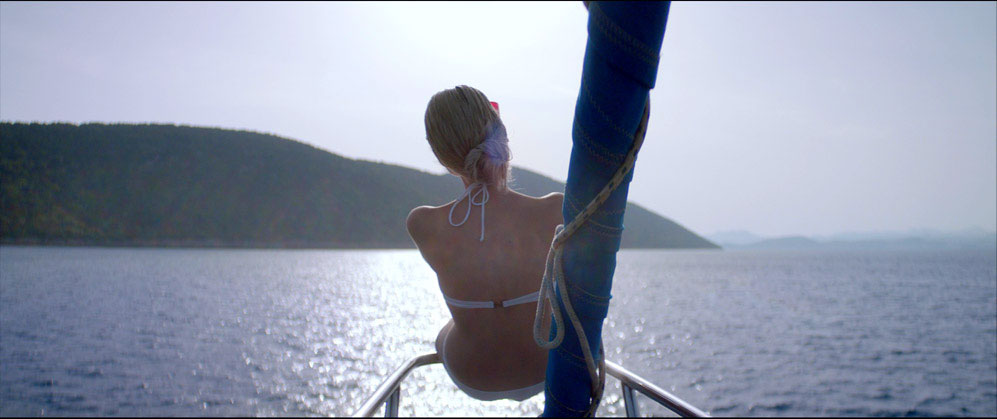
Limited edition exclusive 32-page booklet containing new writing on the film by Anna Bogutskaya, an interview with Isabella Eklöf by Addy Fong, Peter Walsh on Willy Kyrklund, and film credits
Anna Bogutskaya starts her superbly titled essay Pretty Vacant with the words “Holiday is horrific. Not a horror film but harder to watch than one.” I think we could be friends… Her piece dives deeper than my review and has some very insightful things to say about the lifestyle enjoyed by these venal monsters and those who choose to live that life with them. She says about the rape scene that “…it’s soothing to know it’s fake.” I know what she means but the word ‘soothing’ shouldn’t go anywhere near that scene. She sees Michael the monster-in-chief as not being fleshed out (given the circumstances, that’s a really bad way to put it) but she makes a great case for Sascha being utterly inscrutable. Addy Fong’s interview extracts with director Isabella Eklöf, to my surprise, doesn’t suffer too much from repetition. Remember, we’ve had both an interview and a Q&A with Eklöf in the other extras. Here she talks about casting and working with the actors allowing them a certain freedom beyond the screenplay. She talks about the set design and how characters either blend in or stand out, an idea I’d not considered. I was very happy she mentions Bertolt Brecht as he was my shield I used to defend myself from this film. Eklöf talks about how a guy is kicked down concrete stairs and no one is reacting violently about that… It’s about what you are used to seeing and the one thing in a feature film you are not used to seeing is… an erect member. I was fascinated by the fact that her backers were not expecting any kind of return on their investment. I need to meet with these people. Peter Walsh’s Willy Kyrklund is two pages of text describing the man and his work as an accompaniment to the short on the disc. A solid and to be honest, a welcome series of articles not least the first one. It’s nice to know one’s opinion is shared especially when it comes to challenging cinema.
Holiday is unapologetically uncompromising, hyper and disturbingly real in places and crushingly banal in others. Made by skilful craftspeople and a director who knows her own mind and precisely what she is saying. It features some of the ugliest human behaviour I've seen on screen in quite a few years and some of the most depraved characters. It's hard to be sympathetic with Sascha as she makes her own morally dubious choices. As a consequence, she falls further and further into the darkest world bathed in the brightest sunshine. For lovers of challenging cinema, no doubt but the little mischievous imp inside me fiercely wonders how the fate of this film would have played out if it had been directed by a man. Just an idea… Discuss.
|